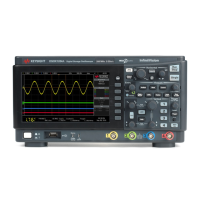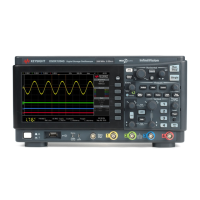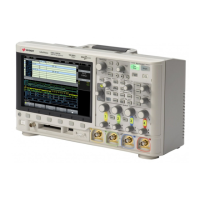136 Keysight InfiniiVision 1200 X-Series and EDUX1052A/G Oscilloscopes User's Guide
13 Acquisition Control
• Averaging — at all time/div settings, the specified number of triggers are
averaged together. Use this mode for reducing noise and increasing
resolution of periodic signals without bandwidth or rise time degradation.
See "Averaging Acquisition Mode" on page 138.
• High Resolution — at slower time/div settings, all samples in the effective
sample period are averaged and the average value is stored. Use this mode
for reducing random noise. See "High Resolution Acquisition Mode" on
page 140.
Normal Acquisition Mode
In Normal mode at slower time/div settings, extra samples are decimated (in other
words, some are thrown away). This mode yields the best display for most
waveforms.
Peak Detect Acquisition Mode
In Peak Detect mode, at slower time/div settings when decimation would normally
occur, minimum and maximum value samples are kept in order to capture
infrequent and narrow events (at the expense of exaggerating any noise). This
mode displays all pulses that are at least as wide as the sample period.
For InfiniiVision 1200 X-Series oscilloscopes, which have a maximum sample rate
of 2 GSa/s, a sample is taken every 500 ps (sample period).
See Also • "Glitch or Narrow Pulse Capture" on page 136
• "Using Peak Detect Mode to Find a Glitch" on page 138
Glitch or Narrow Pulse Capture
A glitch is a rapid change in the waveform that is usually narrow as compared to
the waveform. Peak detect mode can be used to more easily view glitches or
narrow pulses. In peak detect mode, narrow glitches and sharp edges are
displayed more brightly than when in Normal acquire mode, making them easier
to see.
To characterize the glitch, use the cursors or the automatic measurement
capabilities of the oscilloscope.
